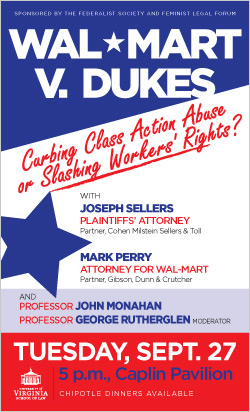Wal-Mart v. Dukes: Curbing Class Action Abuse or Slashing Workers' Rights?
Attorneys representing the parties involved in the controversial Supreme Court case Wal-Mart v. Dukes will debate the issues surrounding the decision on Tuesday at 5 p.m. in Caplin Pavilion.
 Mark Perry, attorney for Wal-Mart and a partner in the law firm Gibson, Dunn & Crutcher, and Joseph Sellers, the plaintiffs' attorney and a partner for Cohen Milstein Sellers & Toll, will discuss the case, in which justices in June dismissed a class action lawsuit involving up to 1.5 million women who sued Wal-Mart for gender discrimination.
Mark Perry, attorney for Wal-Mart and a partner in the law firm Gibson, Dunn & Crutcher, and Joseph Sellers, the plaintiffs' attorney and a partner for Cohen Milstein Sellers & Toll, will discuss the case, in which justices in June dismissed a class action lawsuit involving up to 1.5 million women who sued Wal-Mart for gender discrimination.
University of Virginia law professor John Monahan, whose work was cited in the Supreme Court decision, will also speak at the event, which is sponsored by the Federalist Society and the Feminist Legal Forum. Professor George Rutherglen will moderate the debate.
The event is sponsored by the Federalist Society and Feminist Legal Forum. Chipotle dinners will be served.
More About Wal-Mart v. Dukes
In the 5-4 decision delivered by Justice Antonin Scalia, the court ruled in Wal-Mart v. Dukes that the class action should not have been certified based on "commonality," "the degree to which the class of plaintiffs had enough in common to form a class." There was no companywide evaluation system that applied to all employees, he said, and no proof that Wal-Mart operated under a general policy of discrimination, the justices said.
However, in her dissent, Justice Ruth Bader Ginsburg wrote that the court "gives no credence to the key dispute common to the class: whether Wal-Mart's discretionary pay and promotion policies are discriminatory."
"The plaintiffs' evidence, including class members' tales of their own experiences, suggests that gender bias suffused Wal-Mart's company culture," Ginsburg wrote.
Scalia wrote that the only evidence of a "general policy of discrimination" produced was the testimony of sociologal expert Dr. William Bielby.
Bielby examined Wal-Mart's employee policies and concluded that the company used personnel practices that were biased against female employees and led to disparities in pay and promotion between men and women.
Bielby testified using "social framework" analysis, a practice defined through the work of Monahan and University of Virginia law professor emeritus Larry Walker, in which the use of general social science evidence provides background information or context that may assist the judge or jury when evaluating case-specific evidence.
However, the framers of social framework analysis took issue with the manner in which Bielby applied it to the Wal-Mart case. In a series of articles, Monahan, Walker and University of Virginia law professor Greg Mitchell disavowed the method used by the plaintiffs' expert and argued that he had misused Monahan and Walker's theories to justify his testimony.
Founded in 1819, the University of Virginia School of Law is the second-oldest continuously operating law school in the nation. Consistently ranked among the top law schools, Virginia is a world-renowned training ground for distinguished lawyers and public servants, instilling in them a commitment to leadership, integrity and community service.


